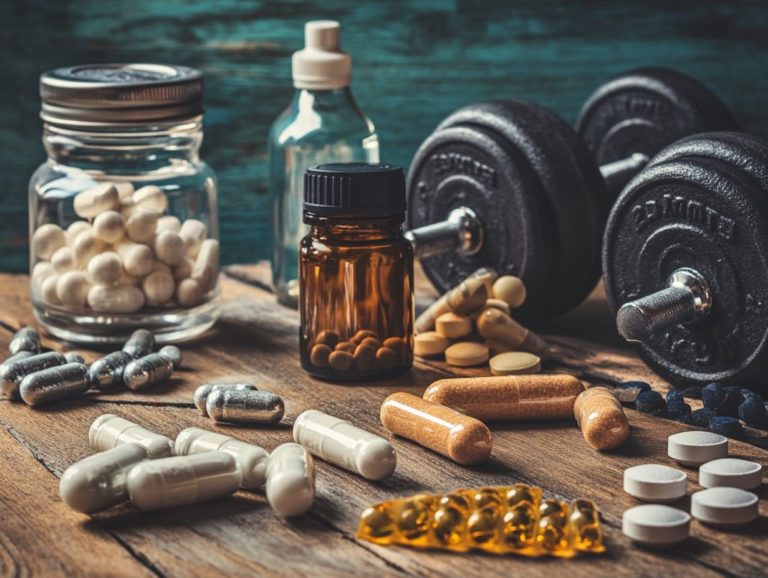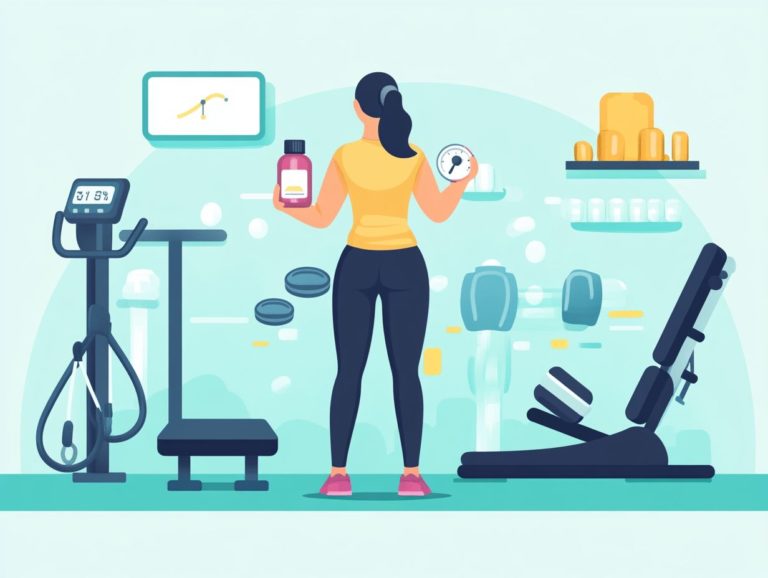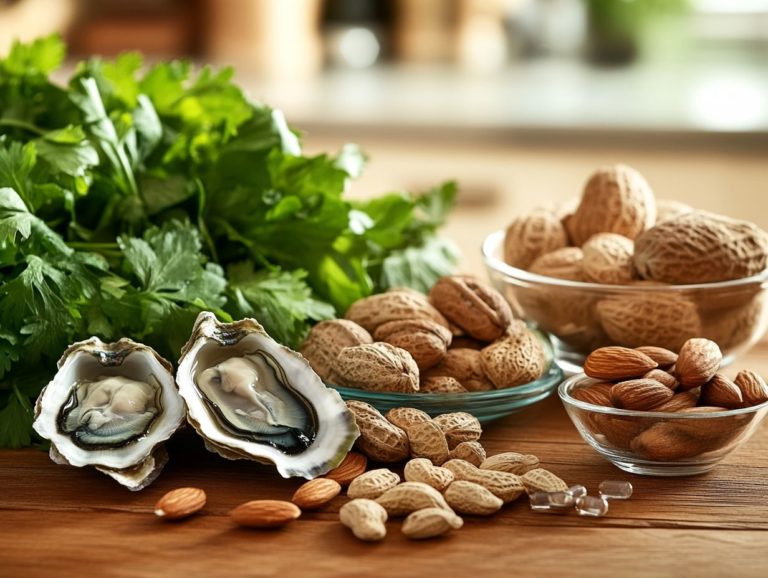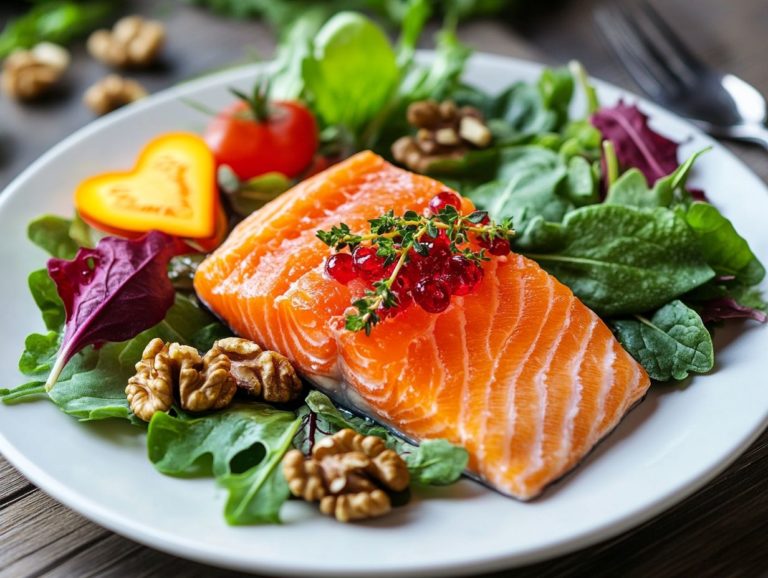The Impact of Iron on Athletic Performance
Iron plays a crucial role in your athletic performance, influencing everything from your energy levels to your endurance.
For athletes, maintaining optimal iron levels is essential for physical capabilities and overall health. This article explores how iron affects energy and endurance, identifies common signs of deficiency, and guides you through diagnosis and treatment.
You ll discover effective strategies to prevent deficiency, ensuring you remain at the peak of your performance. Unlocking the power of iron can supercharge your performance and boost your well-being!
Contents
- Key Takeaways:
- The Role of Iron in Athletic Performance
- Signs of Iron Deficiency in Athletes
- Diagnosing Iron Deficiency
- Treating Iron Deficiency in Athletes
- Preventing Iron Deficiency in Athletes
- Frequently Asked Questions
- What is the impact of iron on athletic performance?
- How does iron deficiency affect athletic performance?
- What are some common symptoms of iron deficiency in athletes?
- How can athletes ensure they are getting enough iron in their diet?
- Are there any risks associated with taking iron supplements for athletic performance?
- How can athletes prevent iron deficiency and maintain optimal iron levels?
Key Takeaways:
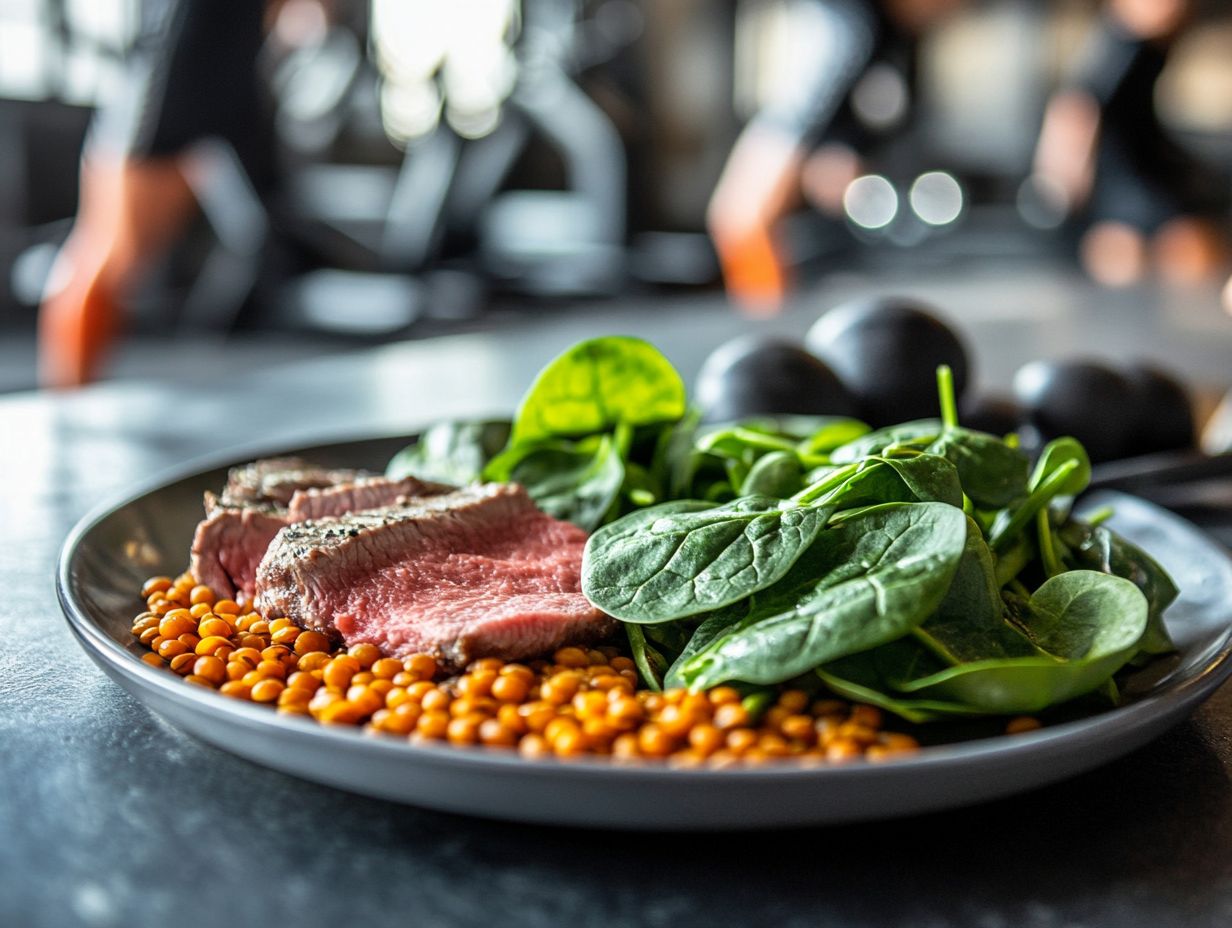
Iron is critical for energy and endurance. Know the signs of deficiency like fatigue and reduced performance to stay at the top of your game!
The Role of Iron in Athletic Performance
Iron is essential for athletic performance, serving as a cornerstone for oxygen transport and energy metabolism. This mineral directly influences your endurance and strength during demanding training sessions.
By supporting optimal hemoglobin levels in your red blood cells, iron ensures that oxygen is efficiently delivered to your muscles, crucial for energy production and effective muscle contraction.
No matter your gender, keeping your iron levels up is key to performing your best. Failing to do so could lead to diminished exercise performance and anemia issues no athlete can afford.
How Iron Affects Energy and Endurance
Iron is a crucial micronutrient that significantly impacts your energy metabolism and endurance, directly influencing your performance during training and competitions.
This essential mineral is vital for forming hemoglobin, a protein that carries oxygen in your blood. When your iron levels are adequate, your muscles receive the oxygen they need during intense workouts, enhancing stamina and delaying fatigue.
As an athlete especially if you re competing in endurance events it s important to monitor your iron levels regularly. A deficiency can lead to decreased performance and a higher risk of injury.
Different dietary sources of iron, such as heme iron from animal products and non-heme iron from plant-based foods, vary in how well they are absorbed. This variation affects their ability to support your overall athletic performance.
Crafting a balanced diet tailored to your specific needs can make a considerable difference in your endurance and energy production.
Signs of Iron Deficiency in Athletes
Spotting the signs of iron deficiency is crucial to keep your performance at its best. The symptoms can be subtle yet significant, potentially leading to anemia and decreased exercise capacity if not addressed.
Stay alert! Taking proactive steps can keep your athletic journey on track!
Common Symptoms to Watch For
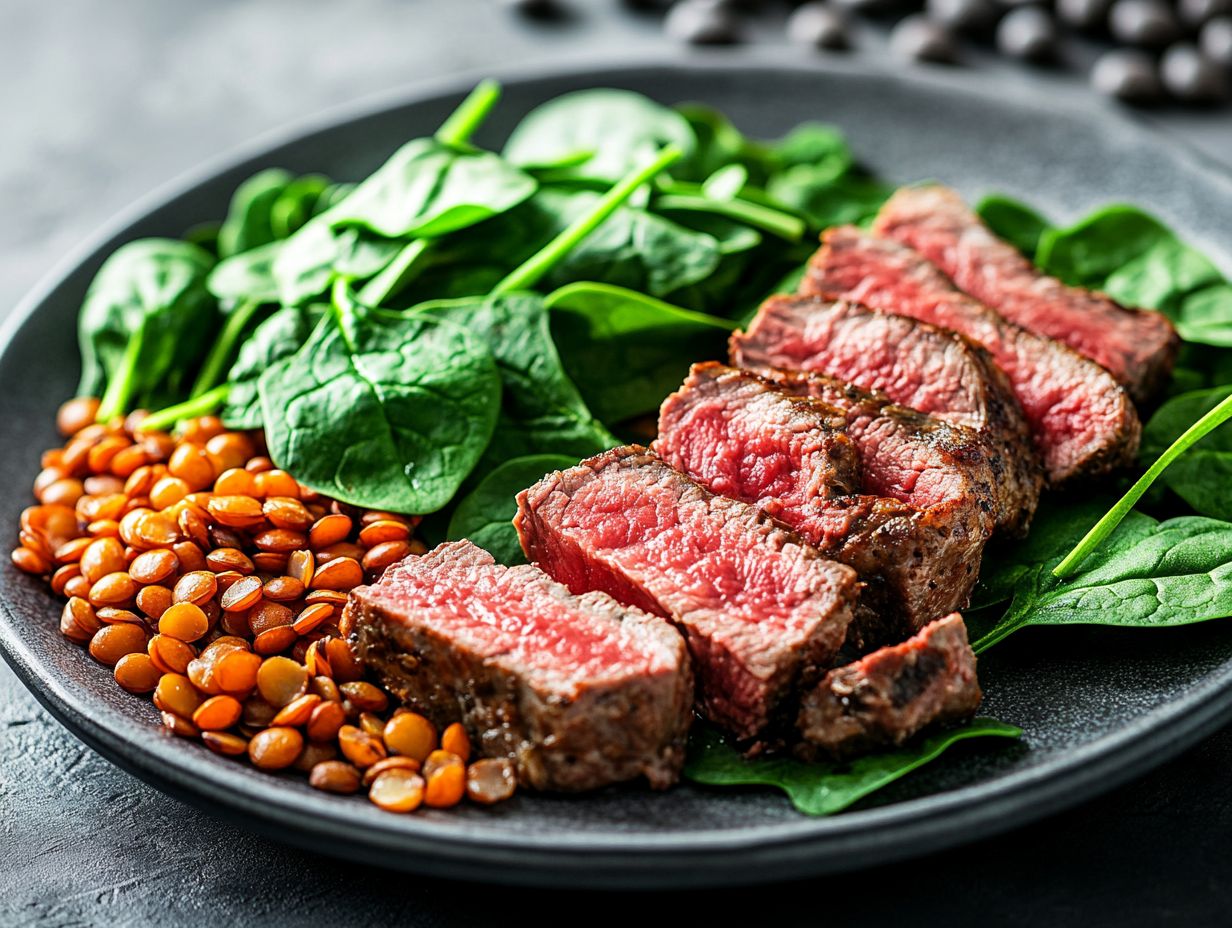
Common symptoms of iron deficiency in athletes include fatigue, weakness, and shortness of breath during exercise. These symptoms can significantly hinder your overall performance and recovery.
Fatigue may feel like a struggle to keep your energy levels up during training, making even moderate workouts feel monumental. Weakness could manifest when you find it difficult to lift weights you usually handle easily.
Shortness of breath may become evident, especially during high-intensity workouts, signaling compromised oxygen transport due to reduced hemoglobin levels.
To assess your condition, monitor how fatigue affects you after workouts and evaluate your performance consistency. Keeping a training diary can be particularly beneficial.
If you notice any symptoms worsening or frequently feel unusually exhausted, don t hesitate to consult a healthcare professional for a thorough evaluation and to rule out any serious conditions.
Diagnosing Iron Deficiency
Diagnosing iron deficiency in athletes requires a meticulous approach, blending clinical assessments with laboratory tests. You ll want to measure serum ferritin and hemoglobin levels to accurately gauge your body s iron stores and overall health status.
This comprehensive evaluation is crucial for understanding your nutritional needs and ensuring peak performance.
Testing and Interpretation of Results
Testing for iron deficiency typically involves measuring your serum ferritin and hemoglobin levels. These measurements provide insights into your iron status and any potential need for dietary adjustments or supplementation.
Understanding these levels is crucial. Ferritin reflects the iron stored in your body, while hemoglobin levels indicate how effectively your blood carries oxygen. Ferritin levels are normal between 30 to 300 ng/mL for men and 12 to 150 ng/mL for women. Hemoglobin levels generally fall between 13.5 to 17.5 g/dL for men and 12.0 to 15.5 g/dL for women.
If you find yourself with low ferritin, you may experience fatigue, reduced endurance, and impaired recovery, all of which can negatively impact your performance. It s crucial to discuss these results with your healthcare provider.
Together, you can determine if further investigations or interventions are necessary, ensuring you maintain sustained energy and achieve optimal training outcomes.
Treating Iron Deficiency in Athletes
Addressing iron deficiency in athletes requires a careful approach that includes diet changes, targeted supplementation, and a thorough understanding of the different types of dietary iron.
It s essential to distinguish between heme iron sourced from animal products and non-heme iron found in plant-based diets. This distinction ensures that you make informed choices to optimize your health and performance.
Supplementation and Dietary Changes
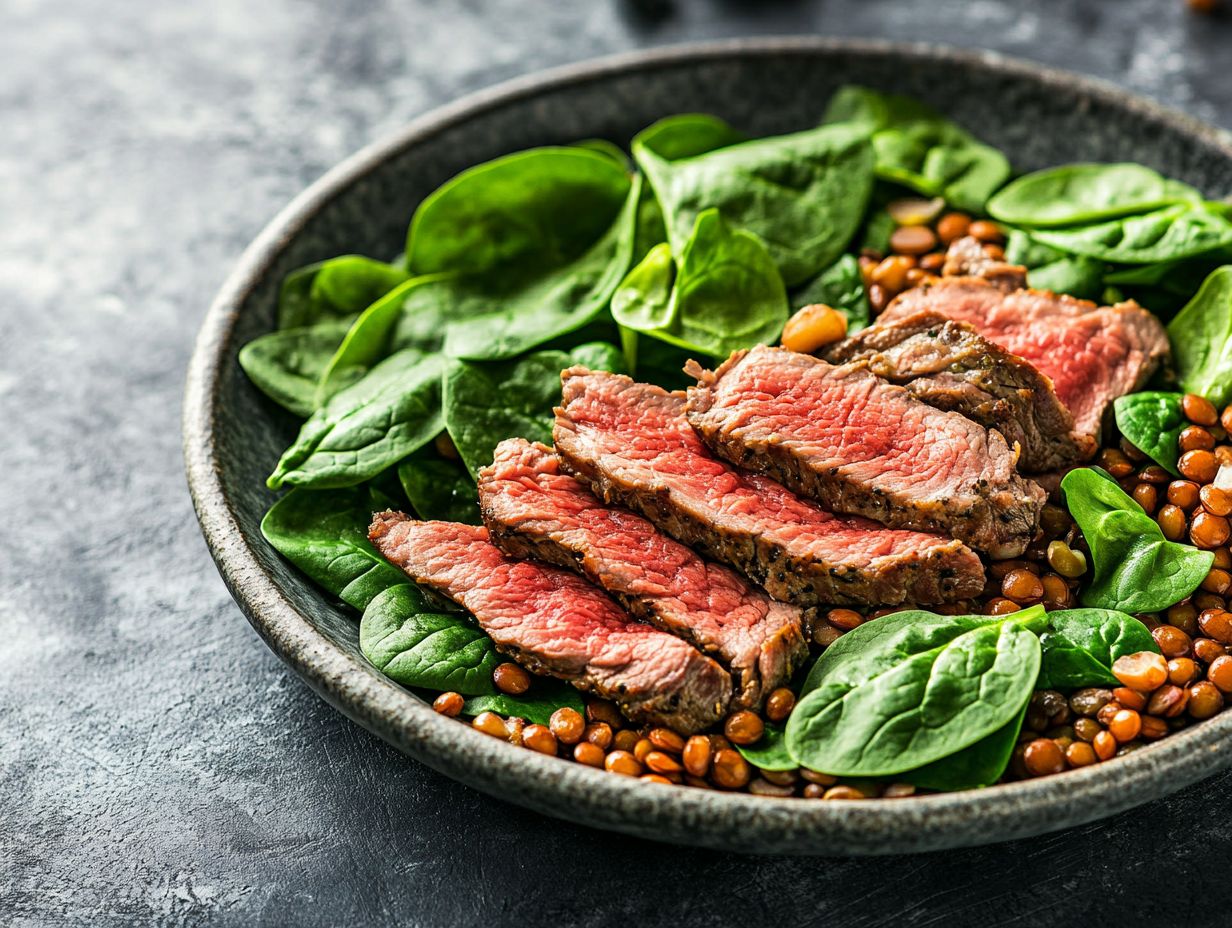
Supplementation and dietary adjustments are crucial in tackling iron deficiency for athletes, providing the essential nutrients needed to maintain optimal hemoglobin levels and enhance overall performance.
When considering iron supplements, ferrous sulfate is an effective option, typically recommended at a dosage of 100 to 200 mg daily. Pairing it with vitamin C can significantly boost absorption. Timing also plays a vital role; taking iron on an empty stomach can maximize uptake, although some may prefer to have it with food to ease any gastrointestinal discomfort.
You can enhance your iron intake with dietary sources. Consider these iron-rich options to boost your intake:
- Heme iron from red meat and poultry
- Non-heme iron from plant-based options like lentils and spinach
While heme iron is more readily absorbed by your body, non-heme iron comes with added health benefits, including antioxidants. However, you may need to plan your meals carefully to optimize its absorption.
Preventing Iron Deficiency in Athletes
Preventing iron deficiency in athletes is a proactive strategy that demands careful meal planning, consistent performance monitoring, and a keen awareness of the specific iron requirements dictated by training intensity and individual physiology.
By taking these steps, you can ensure optimal health and performance, giving you the power to reach your athletic goals.
Effective Strategies for Maintaining Iron Levels
Maintaining optimal iron levels as an athlete requires a thoughtful blend of dietary planning, supplementation, and a keen understanding of your individual needs based on your training regimen.
To start, make sure to include iron-rich foods in every meal think lean meats, legumes, and vibrant dark leafy greens. Pairing these with vitamin C sources will help enhance iron absorption, making your efforts even more effective.
Meal planning is key here; it ensures that nutritious options are readily available, making it easier for you to stick to a balanced diet.
If your dietary sources aren’t quite cutting it, consider exploring supplementation with the guidance of a sports physician. They can offer tailored recommendations based on your unique health assessments and performance goals.
Regular check-ups and blood tests will also be beneficial for monitoring your iron levels, allowing you to make any necessary adjustments to your dietary and training plans.
Frequently Asked Questions
For more information about iron deficiency and its impact on athletic performance, consult with a healthcare professional to ensure you are meeting your nutritional needs.
What is the impact of iron on athletic performance?
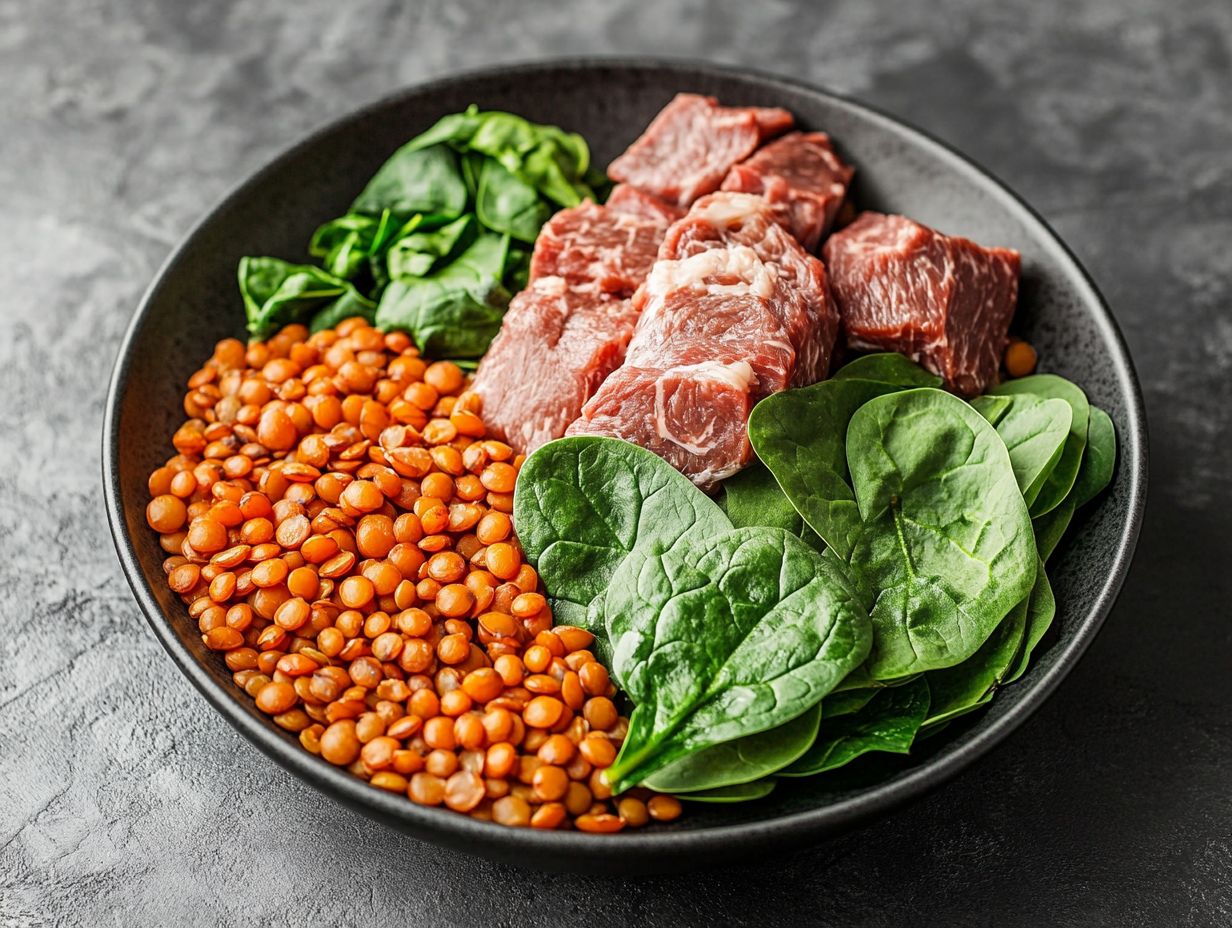
Iron is essential for athletes. It boosts performance and keeps you energized!
It plays a crucial role in producing red blood cells, which deliver oxygen to the muscles.
How does iron deficiency affect athletic performance?
Iron deficiency can lead to anemia. This means your body doesn’t have enough red blood cells to carry oxygen efficiently.
The result? Fatigue, decreased endurance, and poor athletic performance.
What are some common symptoms of iron deficiency in athletes?
Common symptoms include extreme fatigue, shortness of breath, and dizziness.
You might also notice a drop in your exercise performance and cravings for non-food items like ice or clay.
How can athletes ensure they are getting enough iron in their diet?
Incorporating iron-rich foods is key. Think red meat, poultry, fish, leafy greens, and fortified cereals.
Consulting a registered dietitian can also provide personalized nutrition advice.
Are there any risks associated with taking iron supplements for athletic performance?
Iron supplements can help if you’re deficient, but be careful. Too much iron can cause toxicity.
Always consult a healthcare professional before starting any supplements to find the right dosage.
How can athletes prevent iron deficiency and maintain optimal iron levels?
To prevent deficiency, eat a well-balanced diet rich in iron. Monitor your levels regularly.
Consult a healthcare professional if symptoms arise. Incorporating vitamin C-rich foods helps your body absorb iron better.



